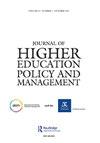Editorial
IF 2.7
3区 教育学
Q1 EDUCATION & EDUCATIONAL RESEARCH
Journal of Higher Education Policy and Management
Pub Date : 2022-11-02
DOI:10.1080/1360080x.2022.2136863
引用次数: 0
Abstract
Dear Colleagues, Welcome to our final issue of 2022, which includes six articles and three book reviews, unusually including two independent reviews of the same book. We start with Hayden McDonald and colleagues’ analysis of health promotion activities at eight Australian universities and taxonomy to help implementation. Similarly, we hope our readers are enjoying some of their own health promotion activities over the holiday break. When staff return in 2023, many university managers will face the invidious task of workload allocations. Our second article, by Beth R. Crisp, reviews the literature and reflects on her professional experience administering these complex systems. Developing ‘a shared understanding of what is “good enough”’ is sound advice, particularly in organisations where unpaid overtime is (almost) a norm of professionalism. The relatively long hours of academic researchers are partly due to strong intrinsic motivation, but universities also seek to leverage this through research incentive systems. The motivations of university managers are clear, but how academics view these incentive structures is not. Félix Guerrero-Alba, Fernando Martín-Alcázar and Gonzalo Sánchez-Gardey undertook a mixed-methods study at a Spanish university to investigate this issue. The new year will see many newly minted PhD graduates returning home after completing their studies abroad. The Malaysian government, like many others, strongly encourages PhD graduates to return and bring home their knowledge, skills and connections. But returnees and their institutions face considerable challenges of adjustment, as outlined by Chang Da Wan, Aliya Kuzhabekova and Botagoz Ispambetova We certainly hope that 2023 will not bring another ‘rapid transition to online learning’ during a pandemic, but that does not mean we cannot be prepared by learning from what worked well. Dijana Townsend, Kate Wilson and Marina Harvey reflect on how the transition was achieved by applying a 3S triage process (see, solve and share) at an Australian military academy. In 2018, the Polish higher education sector underwent a series of reforms, including ‘modernising’ institutional governance with greater autonomy, hierarchy, and vertical steering from leadership. Universities also introduced more external stakeholders, counterbalancing and challenging academic and managerial control. Davide Donina and colleagues’ survey of Polish rectors offers insight into the impact of these changes on different institutional types. Sometimes people can independently and concurrently work on the same good idea. This is what happened when Rita Suswati and Shifei Duan each offered their independent perspectives on the same book Universities and regional engagement: from the exceptional to the everyday by Tatiana Lakovleva, Elisa Thomas, Laila Nordstrand Berg, Römulo JOURNAL OF HIGHER EDUCATION POLICY AND MANAGEMENT 2022, VOL. 44, NO. 6, 529–530 https://doi.org/10.1080/1360080X.2022.2136863编辑
欢迎阅读我们2022年的最后一期,这一期包括六篇文章和三篇书评,不同寻常的是,其中包括对同一本书的两篇独立评论。我们从海登·麦克唐纳和他的同事对澳大利亚八所大学的健康促进活动的分析和有助于实施的分类开始。同样,我们希望我们的读者也能在假期里享受一些自己的健康促进活动。当2023年员工回归时,许多大学管理者将面临工作量分配的艰巨任务。我们的第二篇文章由Beth R. Crisp撰写,回顾了相关文献,并反思了她管理这些复杂系统的专业经验。形成“对什么是“足够好”的共同理解”是一个合理的建议,尤其是在那些无偿加班(几乎)成为职业规范的组织中。学术研究人员的工作时间相对较长,部分原因是由于强烈的内在动机,但大学也试图通过研究激励制度来利用这一点。大学管理者的动机是明确的,但学者如何看待这些激励结构却不清楚。fsamlix Guerrero-Alba, Fernando Martín-Alcázar和Gonzalo Sánchez-Gardey在一所西班牙大学进行了一项混合方法研究来调查这个问题。新的一年里,许多刚毕业的博士毕业生将在国外完成学业后回国。马来西亚政府和其他许多国家一样,强烈鼓励博士毕业生回国,把他们的知识、技能和人脉带回家。但是,正如张大万、阿利亚·库扎别科娃和波塔戈兹·伊斯潘贝托娃所概述的那样,回国人员及其机构面临着相当大的调整挑战。我们当然希望2023年不会在大流行期间再次出现“向在线学习的快速过渡”,但这并不意味着我们不能通过学习成功的经验来做好准备。Dijana Townsend, Kate Wilson和Marina Harvey在澳大利亚一所军事学院反思了如何通过应用3S分类过程(参见,解决和分享)实现过渡。2018年,波兰高等教育部门进行了一系列改革,包括“现代化”机构治理,赋予更大的自主权、等级制度和领导层的垂直指导。大学也引入了更多的外部利益相关者,平衡和挑战学术和管理控制。Davide Donina和他的同事对波兰校长的调查提供了这些变化对不同机构类型的影响的见解。有时人们可以独立地、同时地为同一个好想法工作。这就是当Rita Suswati和Shifei Duan在同一本书中分别提出他们的独立观点时所发生的事情:大学和区域参与:从特殊到日常,Tatiana Lakovleva, Elisa Thomas, Laila Nordstrand Berg, Römulo高等教育政策与管理杂志2022,VOL. 44, NO. 1。6,529 - 530 https://doi.org/10.1080/1360080X.2022.2136863
本文章由计算机程序翻译,如有差异,请以英文原文为准。
求助全文
约1分钟内获得全文
求助全文
来源期刊

Journal of Higher Education Policy and Management
EDUCATION & EDUCATIONAL RESEARCH-
CiteScore
5.30
自引率
7.70%
发文量
52
期刊介绍:
The Journal of Higher Education Policy and Management is an international journal of professional experience and ideas in post-secondary education. It is a must read for those seeking to influence educational policy making. The journal also aims to be of use to managers and senior academic staff who seek to place their work and interests in a broad context and influence educational policy and practice.
 求助内容:
求助内容: 应助结果提醒方式:
应助结果提醒方式:


